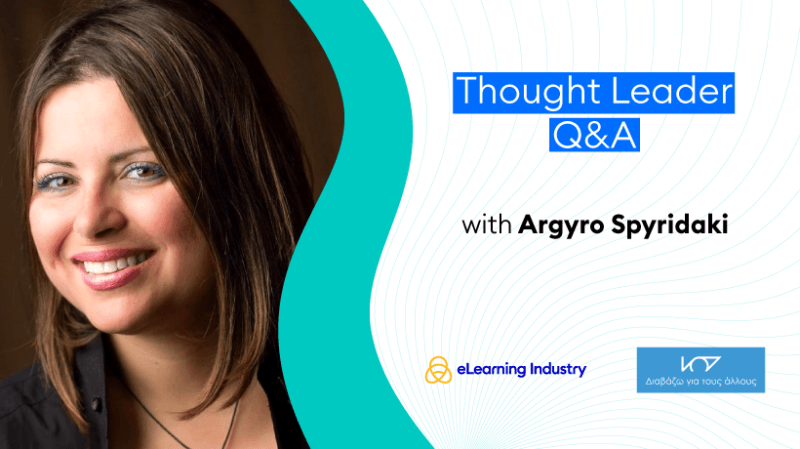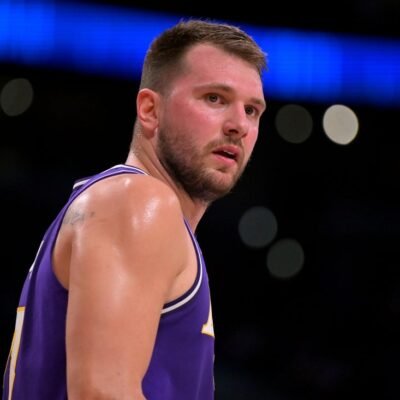
Striving For Equal Access To Knowledge, One Book At A Time
Argyro Spyridaki founded the non-governmental organization Reading to the Others (Diavazo Gia tous Allous) in 2015, when she realized that equal access to knowledge and education should be an inalienable right for every human. For this reason, the mission of Reading to the Others is to ensure equal educational opportunities by providing books to people who may lack access to them. She has a degree in Political Science, a Master’s Degree in Transport Policy, and professional experience in both administrative research and journalism. For the last few years, she has been the General Manager of Reading to the Others and is also Chair of the organization’s Board of Directors.
How did it all start? Is there anything that you wish more people knew about Reading to the Others or the issues you are trying to solve?
Reading to the Others was born during a conversation I had with a friend of mine, who was born blind. We were discussing literature when I suggested that he read The House of Sleep by Jonathan Coe. He replied, “You know, I’d love to read it, I’ve read Coe before, but this particular book isn’t available in the audiobook library for the blind.” I was shocked because I believed that all printed books available for sighted individuals are also published in Braille for those with visual impairments. Of course, that is not the case.
My friend asked me to read it with him. So, I returned home, grabbed the book from the bookcase to check the number of pages, and started thinking about how we could read it. I was thinking of different ways; then, I thought maybe I could record it to also donate it to the audiobook library for the blind.
And just like that, I realized that if I was willing to do this, maybe other people would be willing to do the same. I created a Facebook page called “Reading to the Others” and invited volunteer readers to record books to enrich the audiobook library for the blind. It took off, and the first big meeting of volunteers took place in January 2015. That’s how Reading to the Others was born, but now our goals have expanded.
To eliminate social barriers associated with stereotypes and discrimination regarding blindness and diversity in general, our goal is to inform, raise awareness, and educate [the public] on equal access to education for all and the acceptance of diversity. We want to inspire individual and collective action to build a culture of inclusivity that isn’t imbued with fear, ignorance, or negativity toward diversity but equally accepting and supportive of individuals from socially vulnerable groups.
What’s your most successful program, and why? Give us your best example of the way you’ve seen your organization’s work make a difference.
The most popular program among our volunteers is audiobook recording—a process that allows them to contribute something valuable to people with visual and print disabilities. [1] The books we record have been requested by individuals with visual impairments. They include university textbooks that our beneficiaries need to complete their studies or take admission examinations, as well as literary works.
Yet, our greatest social impact comes from our Therapeutic Readings program for senior individuals, where we create meaningful connections between our volunteers and beneficiaries and provide companionship to people who often feel isolated and socially excluded. After all, it’s one of our leading programs; as of now, we keep company to 180 senior individuals in residential care homes, ten in Athens and one in Crete. Our trained volunteers pay weekly visits to the care homes’ residents, or those living alone at home, to read them a selected book passage and discuss it. The passage sparks conversation, allowing positive moments from the past to resurface.
An example of our work making a difference was when some of our senior beneficiaries from a care home in Crete decided to change the time they visited their church to attend the group readings from our volunteers. These readings bring joy to our beneficiaries and our volunteers, so the impact of our work has been extremely encouraging.
For our team, our awareness-building initiatives in collaboration with schools and businesses are very special, as we witness them cultivate social awareness and solidarity and stimulate reflection among younger generations and professionals.
Tell us a bit more about how your NGO enriches audiobook libraries for the blind and promotes public awareness.
In 2023, Reading to the Others recorded a total of 36 books; right now, we are simultaneously recording 14 books for individuals with print disabilities. Reading to the Others’ digital audiobook library “Athena” is under construction and will soon be available to the public. This is where we will upload all of our recorded books; our beneficiaries will be able to access them with a small subscription fee.
Moreover, we’re collaborating with Panteion University and AMELib (Accessible Multi-modal Electronic Library), where we upload all of our recorded university textbooks so that every student has easy access throughout their attendance.
An extremely valuable tool for raising public awareness regarding the use of audiobooks is our social media channels, where we promote the books we record and the trained volunteers who voice them, sharing their experiences of the recording process.
Do you have a strategic plan, and what key things are you trying to accomplish? What are the areas of opportunity for your organization? What could you do better?
We have already established our strategic plan for the next three years. Our strategic priorities are divided into three axes. The first axis involves the creation of equal learning opportunities by aiming to record 150 literary works and 60 university textbooks, as well as the creation of a digital audiobook repository that will be accessible to every individual with visual or print disabilities from anywhere in Greece. In addition, we aim to keep 330 seniors and patients company through individual or group reading sessions.
The second strategic axis concerns the creation of an inclusive culture by building awareness within the community. Hence, we want to continue our awareness-raising initiatives in schools and companies. We also want to create a guide on the correct use of inclusive language regarding disability and diversity to eliminate phobic social perceptions of people with disabilities and break down discriminatory and negative stereotypes associated with [disabilities].
Our third and final axis focuses on internal organizational restructuring. In the next few years, we will concentrate on growing our network of volunteers, expanding our Board of Directors—the highest governing body of an NGO—and, finally, refining our methods of measuring the impact of our work.
As you can understand, our strategic plan is very important to us. It will guide us in our next steps, helping us stay true to our vision and mission; we hope to inspire the people close to us so that, together, we build a society with equal access to knowledge and education for all.
What are your most urgent needs? What about funding and private donations? What kind of resources help you do what your other sources of funding don’t cover?
For us, it is extremely important that we continue to support users with blindness and print disability, senior individuals, and patients and to pursue change in social culture without letting the organization’s funding get in the way of our initiatives and the social goals we wish to achieve.
As you can understand, donations from foundations are also crucial since they cover the greatest portion of our programs’s implementation. However, it’s the individual and company donations, the funds that can be allocated to test new pilot programs or to cover the immediate and urgent needs of our beneficiaries, that allow us to become more creative and effective. Therefore, we ask people to visit our website, get to know us, and, provided that we earn their trust, support us in any way they can.
In any case, as an NGO, our needs are not just monetary. Many companies help by providing us with the resources we need, such as laptops from time to time. The workspace that we use was also donated, as well as our bookcases. Recently, a law firm donated four printers, which we really needed. Of course, people can support us by donating used books that they no longer need, which we will use during our reading initiatives or resell to create a small income.
Beyond financial support, voluntary services from various professionals, like lawyers, IT specialists, and graphic designers, are very helpful. Equally important is the donation of stationery, plants, and other items that streamline our day-to-day work and make our environment more pleasant.
What would make the greatest difference in helping your organization get better at what it does? How can more people get involved?
To improve our organization, upgrading our technological infrastructure would make the biggest difference. By acquiring new, more modern equipment and software for our recording studio, we would be able to offer better audiobook recording services.
There are many ways that interested individuals can get involved and support our work. First of all, through volunteering, you can offer your time and skills to recordings, readings, administrative support, graphic design, and anything else you can think of. Moreover, donations, through the annual membership subscription or a larger contribution, aid significantly in ensuring the sustainability of our initiatives.
Furthermore, you can share our work with your friends and acquaintances during your get-togethers or on your social media channels and help our audience grow. Finally, as part of their corporate social responsibility programs, companies can work with us to co-organize an awareness-raising activity for their employees or a fundraising event for our organization. And, as mentioned above, specialized services based on each person’s expertise, such as legal advice, graphic design, or IT, are crucial for the continuation of our work.
How can a volunteer use their unique skills, experience, or perspective to further your cause? What additional skills and experience would one like to acquire in this role?
Our volunteers are our strength. Reading to the Others began as a voluntary network—without the support and contribution of our volunteers, we wouldn’t be where we are today.
Once a year, we issue an open call for new volunteers. Those interested in readings undergo a voice assessment with a committee of partners with visual disabilities. If their voice is deemed suitable, they move on to the training stage and then to the studio for the recording of the book upon which we have agreed. The recording process requires preparation and diligence from the volunteer lending their voice. In the end, the result is rewarding for all of us. The books we record are primarily books that have been requested by our beneficiaries.
As for our live Therapeutic Readings, we issue an open call two to three times per year, depending on the needs. Our volunteers interested in these readings are trained on Bibliotherapy techniques and how to properly manage their voice so that they don’t get tired while reading aloud.
Afterward, we bring our volunteers together with our beneficiaries and schedule weekly meetings, which take place under our constant supervision and guidance. We read either in groups, in residential care homes, or individually in homes, to people who cannot read by themselves due to age, illness, or disability. We keep them company, discuss what we have read, and recall experiences and moments from the past. Of course, the passages we choose to read correspond to the cognitive, psycho-emotional level, and the interests of each beneficiary or group.
Beyond the above, our volunteers are also instrumental in our office’s administrative matters. We are a small team, and every bit of help is invaluable. During their visits, our volunteers help us with book scanning, phone correspondence, and our “Library” project. It is a large-scale project that aims to reconstruct and organize our library, classify our books in a way that serves us, and create a lending library where our volunteers can borrow books and passages to read to our senior beneficiaries. Volunteers are involved in organizational and administrative matters throughout the year as our needs continue to grow.
What we look for in a volunteer is a shared belief in our vision of equal access to reading. Next, diligence and team spirit are necessary, as we always work collaboratively and as a team. When it comes to special skills, we are always open to people who want to contribute to our graphic design needs, social media channels, as well as our fundraising efforts; we want to discuss with them ways we can work together and hear their fresh ideas.
What are your next steps or future plans? Is the team at Reading to the Others thinking about expanding? (Either in terms of other types of voluntary actions or in another location/region, etc.)
After applying the Theory of Change, we collectively understood that what we want for the future is to do our part in changing the culture around diversity and acceptance. In the coming years, we want there to be more social awareness around disability, blindness, and the acceptance of others in general. We want to start talking about social stereotypes, we want to start talking about disabilities more openly as an organization, we want to grow closer to the social groups we serve. We want our beneficiaries to tell us what else they need.
That’s why we have also created a digital accessibility seminar, training companies and employees on how to create accessible digital communication flows for their websites and their corporate or personal social media channels. We, as an organization, are also receiving training on these topics. All of our organization’s employees and, one by one, our members are starting to become familiar with accessibility issues.
Wrapping Up
Thanks so much to Argyro Spyridaki for sharing the vision behind Reading to the Others and how our readers can contribute. If you’d like to make your company’s environment more inclusive and your social media content accessible to people with visual disabilities, you can contact the organization to take part in the digital accessibility seminars that their team organizes.
[1] Print disabilities: Difficulty or inability to read printed material effectively, due to total/partial vision loss, severe dyslexia, upper limb disabilities, etc.
Editor’s Note: This Q&A was originally conducted in Greek and translated to English for publication purposes.





